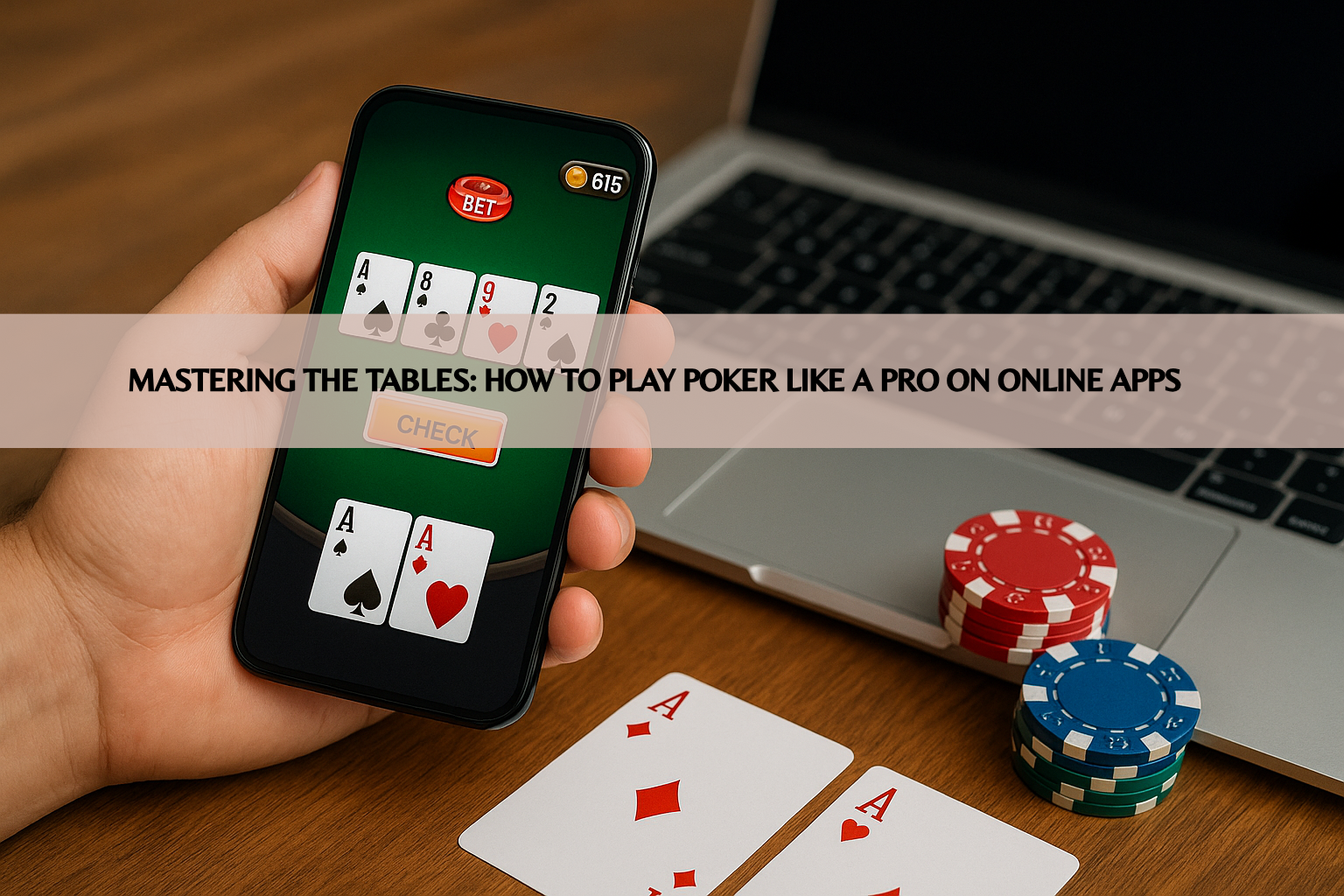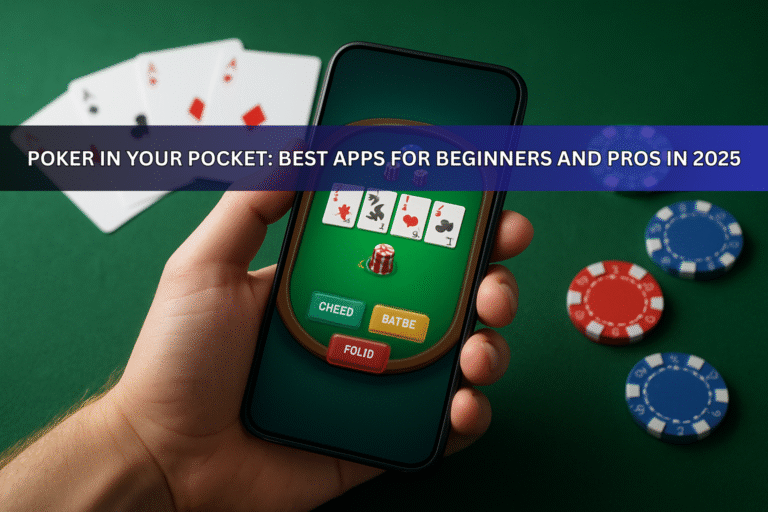Mastering the Tables: How to Play Poker Like a Pro on Online Apps
Poker has evolved far beyond smoky backrooms and glittering casino floors. In 2025, the most competitive action often happens on online poker apps, where players from around the globe compete for real stakes without leaving their homes. But while accessibility has never been greater, so too has the level of competition. To thrive in this digital arena of Rummy games, you’ll need to sharpen your skills, manage your mindset, and adapt to the unique dynamics of online play.
Here’s a deep dive into how to approach online poker apps like a professional—covering strategy, mindset, tools, and the nuances that can give you a winning edge.

1. Understand the Differences Between Live and Online Poker
While the rules remain the same, the environment of online poker changes everything. Online games are typically faster—more hands per hour means less time to think. This accelerates decision-making and amplifies variance. You also won’t be able to rely on traditional physical tells; instead, you must focus on betting patterns, timing tells, and statistics.
Another difference: online players tend to be more aggressive. Without the social pressure of face-to-face interaction, Teen Patti Stars and other opponents are more willing to bluff, three-bet light, and take unconventional lines. You need to prepare for this by tightening your decision-making process and learning to counter over-aggression.
2. Master the Fundamentals First
Before you start chasing advanced plays, ensure your basics are solid:
- Hand Selection: Know which starting hands to play from each position. Apps often provide quick-reference charts; study them until they’re second nature.
- Positional Awareness: Being “in position” (acting after your opponent) is one of the strongest advantages in online poker.
- Bet Sizing: Adjust your bets to the pot size, your hand strength, and your opponent’s tendencies.
- Pot Odds & Equity: Understand the math behind whether a call is profitable in the long run.
Professionals don’t just know these concepts—they apply them consistently under pressure.
3. Leverage the Digital Environment
Online poker apps offer tools and features you can use to your advantage. Some have built-in hand histories, note-taking options, or player stats (HUDs—Heads-Up Displays—on compatible platforms). Learn to:
- Review hands after each session to spot mistakes.
- Tag tricky spots to analyze later.
- Take notes on regular opponents—mark who bluffs often, who calls too much, and who plays conservatively.
By building a database of your competition, you can make more informed decisions.
4. Play Multiple Tables—But Don’t Overdo It
One huge perk of online poker apps is multi-tabling—playing several games simultaneously. This increases your volume and smooths out short-term variance. However, jumping into too many tables too soon will dilute your focus and decision-making quality.
With poker regulation in mind, start with one or two tables and add more as you feel comfortable. Most pros have a “sweet spot” where they maximize hands played without sacrificing concentration—often between four and eight tables.
5. Develop a Balanced Range
Beginners often become predictable—either too tight (only playing premium hands) or too loose (playing too many weak hands). Pros maintain a balanced range—mixing strong hands with bluffs in a way that makes them hard to read.
For example, when you three-bet pre-flop, sometimes do it with pocket aces, sometimes with suited connectors, and occasionally with weaker hands that play well post-flop. This keeps opponents guessing and prevents them from exploiting your tendencies.
6. Exploit Weaknesses Ruthlessly
On online poker apps, you’ll encounter many recreational players. They might:
- Call too often with weak hands.
- Over-bluff in the wrong spots.
- Chase draws without proper odds.
Once you spot these leaks, adjust accordingly. Against calling stations, value-bet heavily with strong hands. Against hyper-aggressive opponents, trap by checking with big hands and letting them bluff into you.
Professional poker in 2025 isn’t about playing “perfect GTO” (Game Theory Optimal) all the time—it’s about maximizing profit against the specific players in front of you.
7. Manage Your Bankroll Like a Business
Even top pros experience downswings. The difference is that they prepare for them. Proper bankroll management ensures you can withstand variance without going broke.
General guidelines for online play:
- Cash games: Keep at least 40–50 buy-ins for your chosen stakes.
- Tournaments: Maintain 100+ buy-ins, as variance is much higher.
Never chase losses by moving up stakes too quickly. Treat your bankroll as your business capital, not gambling money.

8. Master Your Mental Game
Online poker can be emotionally taxing. Bad beats, long losing stretches, and aggressive opponents can all push you into “tilt”—a state where emotion overrides logic.
Pros combat this by:
- Taking breaks when frustration builds.
- Reviewing hands instead of blaming luck.
- Practicing mindfulness to maintain focus.
Remember: the goal isn’t to win every session—it’s to make good decisions consistently over time.
9. Use Technology for Study
To play like a pro, you need to study like one. Many online players improve their game using:
- Poker solvers (like PioSolver or GTO Wizard) analyze optimal plays.
- Equity calculators to compare hand strengths in different scenarios.
- Training videos from established professionals.
Dedicate time each week to studying—not just playing. This keeps you ahead of the average app user, who rarely studies away from the table or prepares for tournaments.
10. Specialize, but Stay Flexible
Some players excel in No-Limit Hold’em cash games, others in multi-table tournaments (MTTs) or Sit & Go’s. Pick a primary format and become highly skilled in it. However, don’t completely ignore other formats—app ecosystems often run mixed events, and being flexible can open more profit opportunities.
11. Build a Professional Routine
Treat online poker like a job:
- Set specific session times.
- Track your results meticulously.
- Warm up before playing (review notes, refresh strategy concepts).
- Cool down afterward (log results, review key hands).
This structured approach helps you stay consistent and avoid burnout.
12. Avoid Common Pitfalls
Many skilled players still fail online because they:
- Play while distracted (watching TV, chatting).
- Ignore table selection (not seeking out weaker opponents).
- Overcomplicate decisions instead of sticking to solid fundamentals.
- Play tired or emotionally compromised.
Professional-level play requires discipline—sometimes the best decision is to skip a session entirely.
Final Thoughts: Playing Like a Pro on Poker Apps
In 2025, online poker apps and the series of poker have created a global, competitive environment where only disciplined, adaptable, and strategically sharp players thrive. To master the tables, you need more than just a good grasp of the rules—you need a combination of strategic depth, emotional control, and long-term planning.
By blending solid fundamentals with the advantages of digital tools, adjusting to your opponents’ weaknesses, and managing your bankroll with care, you can elevate your game to professional levels.
In online poker, there’s no magic shortcut—just consistent, well-informed decisions over time. If you can do that while embracing the speed and intensity of online play, you’ll not only survive the competition—you’ll thrive.








